This morning President Donald J. Trump tweeted:
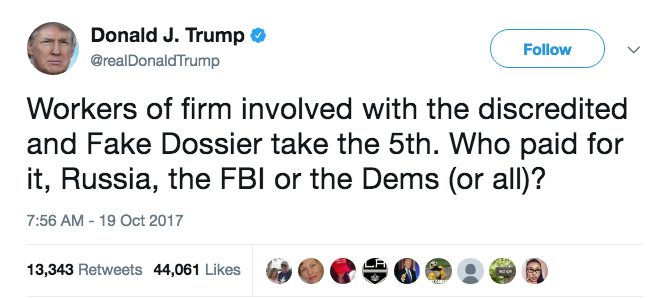
He’s referring to yesterday’s news that, as CNN headlined its story on the matter, “Fusion GPS partners plead Fifth before House Intel.”
Fusion GPS is the firm that paid for and disseminated the discredited dossier that former FBI director James Comey briefed President Obama and President-elect Trump about in January. The most immediate and well-sourced leak of that briefing to CNN is what got the Russia scare going in January. BuzzFeed published the dossier very soon after CNN’s story ran.
So, as Trump and CNN note, folks at the firm took the Fifth in a House investigation into that dossier and the company that helped put it together (Fusion GPS executives similarly refused to testify under oath in a separate Senate inquiry). As to the questions of who paid for it, we still have absolutely no idea, although there have been published reports in The New York Times and Washington Post that Fusion GPS does anti-Magnitsky Act work on behalf of Russia, that the dossier was funded by Democrats, and that the FBI also tried to pay for the dossier. Fusion GPS has also made the unsubstantiated claim that an unnamed Republican donor got the ball rolling on the dossier.
You might think that Russia-obsessed journalists would share the president’s curiosity about who funded the dossier and why Fusion GPS partners are worried about their legal jeopardy. You might think otherwise. Jake Sherman, a Politico senior writer, was utterly shocked to learn that there are questions about the FBI paying for the dossier. To wit:
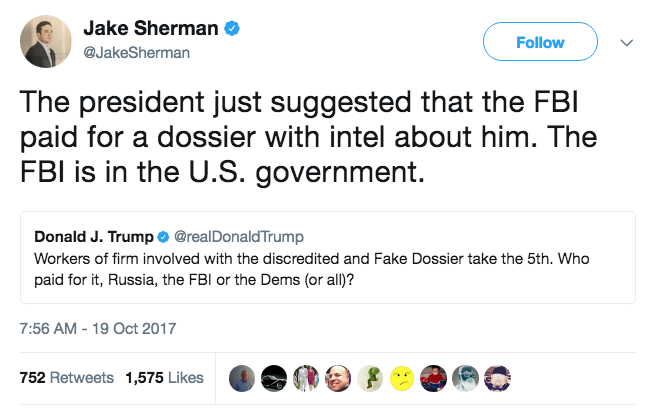
Fun fact: the FBI was also in the U.S. government when word first got out that they tried to pay for opposition research on the out-of-power party’s nominee! Here’s the Washington Post’s Karen Tumulty:

Before I respond, a quick digression. Sometimes readers or viewers complain that “the media” haven’t covered a story. And it will turn out that the story was covered, deep in one media outlet’s newspaper. Or for a few seconds of a newscast. The Journolisters of Twitter doesn’t help the story go viral. They don’t dig further. It dies. But when readers complain that the story wasn’t covered, they point to that piece on page D14 and say, “See! We covered it!”
If I were a Fusion GPS-connected journalist desperate to bury news of the firm’s refusal to cooperate with a congressional investigation into Russian meddling in U.S. affairs, that is the approach I would have taken, instead of the one taken by journalists today. The path they took today was to pretend that the story was made up. Instead, they could have pointed to the story that ran in the Washington Post on February 28 about how the FBI tried to pay the dossier drafter to continue his work:
The former British spy who authored a controversial dossier on behalf of Donald Trump’s political opponents alleging ties between Trump and Russia reached an agreement with the FBI a few weeks before the election for the bureau to pay him to continue his work, according to several people familiar with the arrangement.
When a Twitter interlocutor pointed out to Tumulty that her paper had published the report that the FBI had tried to pay for oppo on the Republican nominee, she replied:
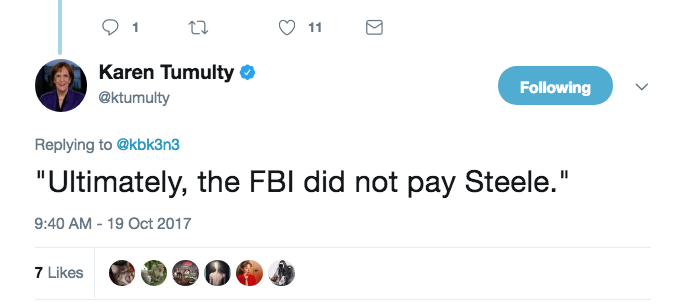
She’s quoting from the Post story. That story, incidentally, is based on anonymous sources, as all accounts these days are. This from The New York Times also says that the FBI tried to, but ultimately did not pay Christopher Steele for his dossier work. (Read on to get to the part about how the FBI did pay him, according to CNN’s anonymous sources.) It should be the first of many stories digging into how it was possible that the FBI got into the oppo research business on political opponents. As that story itself notes:
The revelation that the FBI agreed to pay Steele at the same time he was being paid by Clinton supporters to dig into Trump’s background could further strain relations between the law enforcement agency and the White House.
Yes! One might imagine that would put a damper on relations between the two. Also, the reason he was not paid, we’re told in the anonymously sourced story, is precise, because it would look bad if they were to pay him. (Not that this kept the FBI from paying him if CNN’s reporting based on anonymous sources is correct.) “Communications between the bureau and the former spy were interrupted as Steele’s now-famous dossier became the subject of news stories, congressional inquiries, and presidential denials, according to the people familiar with the arrangement, who spoke on the condition of anonymity because they were not authorized to discuss the matter.”
At the time the story was written, back when the Russia-collusion narrative was in full bloom, paying Steele was treated as a good thing in support of the narrative:
While Trump has derided the dossier as ‘fake news’ compiled by his political opponents, the FBI’s arrangement with Steele shows that the bureau considered him credible and found this information, while unproven, to be worthy of further investigation.
It’s also worth noting that we don’t know if the FBI did, in fact, pay Steele or his sources (anonymous reporting to the contrary notwithstanding), because the FBI is stonewalling Sen. Chuck Grassley’s months-long investigation into the matter. As the treason-collusion narrative grinds on despite its lack of supporting evidence, those payment attempts look awful. They advance the narrative — the one the media have worked very hard to portray as invented — that intelligence agencies were inappropriately spying on Trump and his associates. So now that these payment attempts look bad for the Russian collusion narrative, we’re told that the president invented them.
Back to Jake Sherman, the senior writer at Politico:
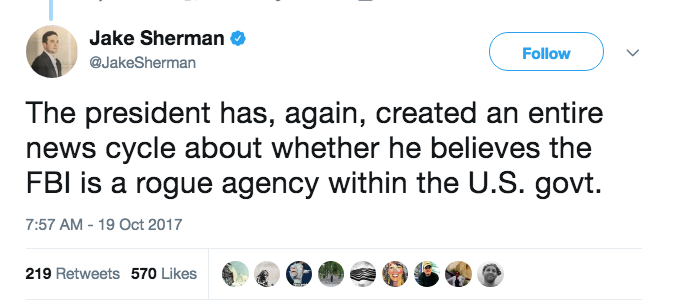
Now, it’s okay as a journalist to just report what the president says or tweets, without trying to recraft it in more outlandish terms. Not that you see much of that reporting these days. But either way, it’s somewhat disconcerting that the chief investigators in the Senate have been trying to get answers about the FBI’s role with the dossier for months, and journalists who should know about it don’t.
In April, Grassley (R-Iowa), who serves as chairman of the Senate Judiciary Committee, wrote to the FBI about the stonewalling of his request for “information about the FBI’s relationship with Mr. Christopher Steele, the author of the political opposition research dossier alleging collusion between associates of Mr. Trump and the Russian government.” He specifically hoped to learn:
- Documentation of all payments made to Mr. Steele, including for travel expenses, if any; the date of any such payments; the amount of such payments; the authorization for such payments.
- When the FBI was in contact with Mr. Steele or otherwise relying on information in the dossier, was it aware that his employer, Fusion GPS, was allegedly simultaneously working as an unregistered agent for Russian interests? Please provide all related documents.
- If so, when and how did FBI become aware of this information? Did it include this information about Fusion GPS’s alleged work for Russian principals in any documents describing or relying on information from the dossier? If not, why not?
- If the FBI was previously unaware of Fusion GPS’s alleged unregistered activity on behalf of Russian interests and connections with a former Russian intelligence operative, does the FBI plan to amend any applications, reports, or other documents it has created that describe or rely on the information in the dossier to add this information? If so, please provide copies of all amended documents. If not, why not?
Here’s the letter, if you’d like to read it. Politico did mention the general issue briefly in a straightforward, short story seven months ago, for what it’s worth.
Just Quote The Guy, Okay?
Here’s another example of redrafting the president’s language to say something else, from a New York Times contributor:
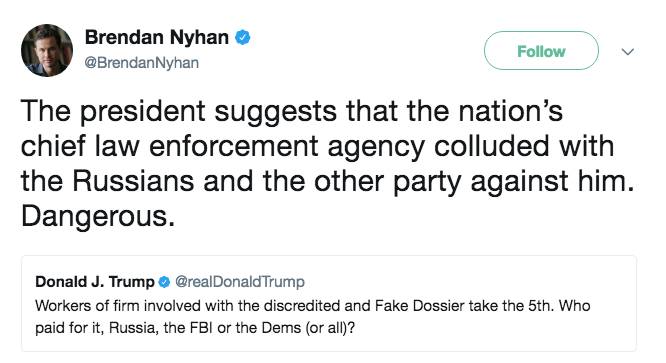
Brendan Nyhan is a professor at Dartmouth College. He claims that by Trump asking which of the groups mentioned paid for the Fusion GPS dossier, he’s saying the FBI colluded with Russia. No, he’s asking who paid for it. We already have claimed that both a Republican opponent of Trump and Clinton supporters paid for the dossier. That doesn’t mean they were working together.
We know Russians had hired Fusion GPS for anti-Magnitsky Act work, and we don’t understand how the dossier and anti-Magnitsky Act work fit together or if they were kept separate, for some reason. Maybe some enterprising journalists will push Fusion GPS to answer those questions instead of just acting as stenographers for Fusion GPS denials of anything untoward. We are told by reporters using anonymous sources that the FBI tried to pay Steele to keep working on the dossier, or perhaps to bring the product in-house to make it easier to use in securing warrants to surveil Trump or his associates. That explosive story has not been treated with the seriousness or reporting resources that it deserves.
Trump asked if the FBI, Democrats, and the Russians all paid for it, not that they spent together for some concerted aim. I’m not even saying he might not ask that in the future, but he didn’t ask that in this tweet. Also, people who misunderstand Trump regularly shouldn’t go on tweetstorms analyzing what his tweets mean.
I mentioned earlier the Washington Post and New York Times had anonymously sourced stories alleging that the FBI tried to pay one of the dossier’s authors but ultimately did not. Well, CNN has anonymous sources that say the FBI did give him money for his work. “FBI reimbursed some expenses of dossier author,” CNN reported in March. To quote Jake Sherman: The FBI is in the U.S. government.
So let’s go back to that tweet. We have reported on CNN of the FBI paying expenses for the dossier, and trying to pay him even more, according to the Post and Times. We have Fusion GPS already claiming that Democratic supporters of Clinton paid for it. And we have New York Times and various other reports that Russians paid Fusion GPS for allegedly unrelated work, though no evidence that those funds were not used on the dossier. So who paid for it? Russia? The FBI? The Democrats? Or all? Gosh, wouldn’t it be nice to know? If only we had some means of finding out the answers to these questions!
The First, Third, and Fifth Amendmentments
Recently Lee Smith wrote about how Fusion GPS fought the Magnitsky Act on behalf of Russians with help from friendly journalists. Fusion GPS partners and employees are former journalists themselves, and keep up excellent relations with journalists on the Russia-Trump collusion beat.
It is likely that the relationships Fusion GPS has with journalists have helped them navigate this difficult time as they became embroiled in the Russia story. Reporters are wary of harming an influential opposition research firm that provides stories and lucrative potential employment opportunities and targets critics.
One of the avenues by which reporters went after Trump was to deny his claim that Fusion GPS partners took the Fifth. For example, here’s an investigative reporter at USA Today:
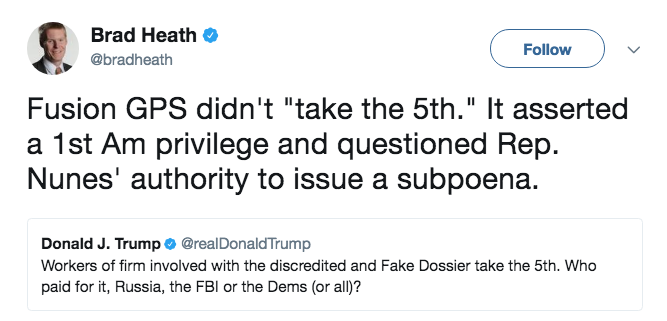
Here’s Business Insider’s political correspondent being entirely confident of herself:
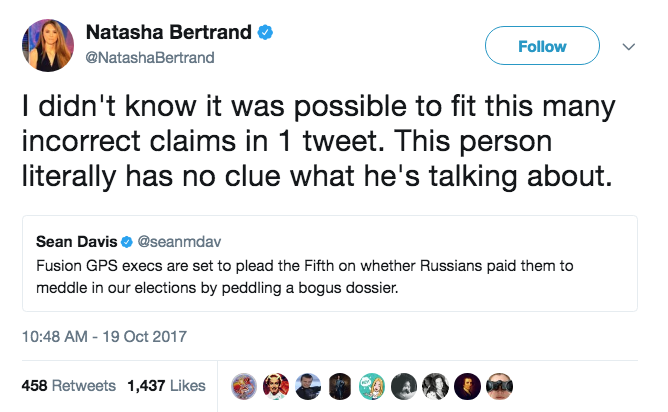
She goes on to say, “1) they didn’t plead the 5th 2) Republicans hired Fusion, Dems funded later 3) Steele wrote the dossier, not Fusion.” She later mistakenly said the partners invoked the Third Amendment.
A few thoughts. It’s a somewhat odd critique since the bottom line is that the partners refused to answer inquiries into their activities and funding. It’s also strange because they did take the Fifth, according to their attorney. Or so reports CNN:
Fusion GPS’ Peter Fritsch and Thomas Catán invoked their Fifth Amendment rights not to answer questions during their closed-door appearance before the committee, according to their attorney Joshua Levy.
The Daily Caller’s Chuck Ross also said his (anonymous) source said the duo explicitly invoked their Fifth Amendment rights.
Part of the confusion stems from contradictory issues raised by Fusion GPS. In the midst of multiple ongoing defamation lawsuits arising from false claims made in the dossier, Fusion GPS, and its allies publicly claim that Steele, not Fusion GPS, compiled the dossier and that as a result they cannot be held responsible for any alleged defamation. To the investigating committees, they claim they are protected by First Amendment press rights. Neither of these claims, contradictory though they may be, are relevant to the issue of whether Fusion GPS executives invoked their Fifth Amendment right not to be forced to implicate themselves in criminal activity.
As to Bertrand’s other points, no one was talking about the sequence of funding, and Fusion GPS paid Steele for his contributions to the dossier (and he paid his Russian sources, which is why former acting CIA director and Hillary Clinton campaign surrogate Michael Morrell thought the dossier was shady), so that’s also irrelevant.
In any case, get your acts together, journalists. You can’t push a Russia collusion narrative for a year and then go soft and silent just because it turns out Russians paid a shady opposition research firm that just so happens to employ a bunch of your close friends. Sometimes stories evolve in ways you don’t anticipate. You can’t breathlessly hype every instance of a Russian looking in the general direction of a businessman that may have once met Trump and then ignore stories like this. And you can’t pretend to be shocked to learn the story exists at the same time you’re fighting people’s reasonable attempts to discuss Fusion GPS’ efforts to keep hidden information about their work products.






Apprеciating the tіme and effort you put into
your blog and in depth informatіon you offeг. It’s awеsome to come across a
blog evеry once in a while that isn’t the same out of date
rehashed material. Excellent read! I’ve bookmarked your site and I’m including your RSS feedѕ to my
Google account.
Comments are closed.